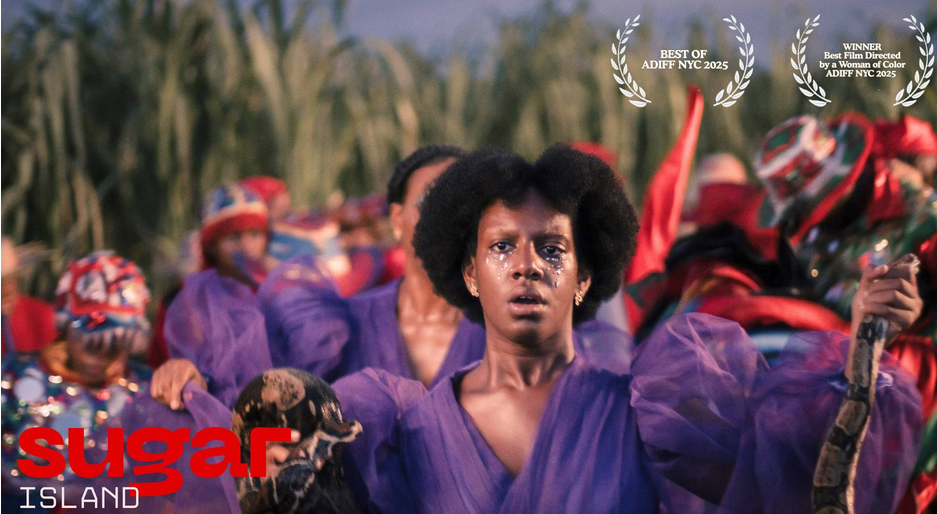You can’t miss this. Photo: ImageNation’s
The “sunken place” under a star-lit, open sky. And live music. Is there a better way to spend a summer evening?
ImageNation will enlighten and enliven our summer with THIS MONDAY EVENING’S presentation of “GET OUT,” Jordan Peele’s breakout artistic, critical, financial, and social grand slam of a film. He combines melodrama, humor, sci-fi, and horror to create an already-a-classic film that speaks his truth about America.
Is this one of the best films released this year? Yes! And I don’t care what #OscarsSoWhite has to say next winter. That’s why you “betta mus come” to this program – even if you’ve seen it in the theater.
The multi-media program will take place at the amphitheater of Marcus Garvey Park, one of Harlem’s Historic parks. It will begin at 6:00 PM, with DJ Brittofied working the turntables. Recording artist V. Ferg will perform live with the collective of artists he calls Creative Public Offering. The film screening will begin at dusk, around 8:30 PM.
This evening is part of ImageNation’s 15th year of summer film and live music. Their Soul Cinema and Music under the Stars program will feature 6 films and run until September 9th. Due to the significance of each film in this series, Guerrilla Journalism will have separate previews and discussions before each offering. Ava Du Vernay’s film, “THE 13th,” her dissection and discussion of freedom, slavery, and America’s school-to-prison pipeline will be the next film. It will be shown on August 12th. The super-popular Soul Train Tribute will provide nostalgia, line dancing, maybe a few platform shoes and hot pants.
“We are excited to kick off our 2017 season,” says ImageNation founder Moikgantsi Kgama. “Not only is it our 15th anniversary, but we have the honor of screening academy award nominated works by filmmakers we have worked closely with over the years. And, we have added a health advocacy piece that we are extremely proud of!”
ImageNation (no, not imagination, although they have plenty of that too) is a dynamic artistic presence in Harlem. It is slowly changing the way the community understands the role of film. Step by step, screening by screening, they are weaning us off the Hollywood garbage by exposing the public to independently-produced, lower budget, higher quality movies. These new independent films entertain and inform without requiring us to deny the world, the reality that we actually inhabit and experience.
The conception of Moikgantsi Kgama (Founder & Executive Director) and her husband Gregory Gates (Executive Producer,) ImageNation has gone from lower Manhattan and Brooklyn to their current HQ at the Raw Space. Along the way, they’ve educated at least one hundred thousand viewer/participants in South Africa, Scotland, and across the USA.
Embodying the concept of self-determination, they have collaborated with Ava Du Vernay as a charter member/founder of ARRAY, a fledgling international film distribution network that will allow artists to distribute their work without the “green light” of the Hollywood old boys’ club.
And they have tricked-out their Raw Space storefront, moving towards the creation of a world class screening, exhibition, performing, drinking and relaxing place.
GET OUT, if you haven’t already heard, tells the story of interracial couple Chris (Daniel Kaluuya) and sweetheart Rose (Allison Williams,) whose relationship has reached the point where it’s time to meet Rose’s ultra-white, ultra-liberal, ultra-Obama supporting parents.
Despite warnings from his best friend Rod (Lil Rel Lowery,) off they go to the isolated country estate. This begins a scary, funny, gory, and ultimately thought-provoking weekend where no one and nothing is the way it seems. Chris is attacked by Rose’s drunken brother, patronized by her ebonics-spewing father, and hypnotized by her mother. She locks Chris in the sunken place and his life depends on figuring a way out.
There are at least three important, discussion-worthy take outs from this film. (And when is the last time any horror film had something worth remembering, let alone worth discussing?) Two features, the buddy character and the “sunken place” metaphor, tie this very modern film to some of the oldest traditions of Afro-American storytelling and song. The third feature is the director’s obvious dislike of current political realities, particularly the unreliable white liberal element, that most significant political ally of the Black community.
The “sunken place” is not a real world space. It a place of mental imprisonment that is intended to facilitate actual physical enslavement. According to director Peele, “The sunken place means we’re marginalized. No matter how hard we scream, the system silences us.” Although a new turn of phrase, it describes an old reality for the Black community, that nauseous feeling when things start to go wrong – as they often do.
His invocation of the phrase reminded me, Sankofa-style, of the 1928 recording by the MEMPHIS JUG BAND, whose culturally-appropriated classic “Steallin’ Stealin” included this early description of the “sunken place” phenomenon:
If you don’t believe I love ya, Look what a fool I’ve been
If you don’t believe I’m sinkin,’ Look what a hole I’m in
Ironically, if not surprisingly, writing credit for this tune was “confused” and assigned to various folk/rock artists who covered the song in the 1960’s. Make it plain Grateful Dead.
In white America, it’s all about stealing the black man’s stuff. In the movie, the grand plan was (spoiler alert! – although the movie is 6 months old and there should be few surprises left) to steal Chris’ body and/or parts for sale to the highest bidder.
And then there’s Rod. He provides much of the raunchy comedy but proves to be the every-man voice of reason and wisdom. He has high importance in the plot, and by extension, to the broader African American community. Rod is obviously the lower class-ed of the pair, just a blue color bro. Chris is the middle class/Sidney Poitier type, who thinks he’s having a post-racial romance in a post-racial America. Both Chris and Rose dismiss Rod’s warnings as the brother’s usual, inconsequential, jive-talking.
But Rod, who may be the film’s real hero, is unsuccessfully trying to save Chris from his misplaced trust of the liberal element. He seems to be a clown, but he’s telling the truth with every warning. DON’T GO he says before his buddy departures. GET OUT he says at every subsequent opportunity.
Rod is actually the famous signifying monkey, transposed to this time and place. He’s the Afro-American version of the trickster Esu Elegbara from Yoruba mythology. The Haitians call him Papa Legba. A long time foundation of our culture, everyone including Cab Calloway, Oscar Brown Jr, Schoolly D, and Rudy Ray Moore have sung his praises. Check Oscar Brown’s version (Rudy Ray Moore’s interpretation might be a little extreme, too graphic for this publication.)
In the tradition, the trickster stands at the crossroads, or at the gateway between the spiritual and ‘real” world. And in the film’s climax, Rod is at the gates of the plantation as he tries to rescue his dumb buddy.
Peele’s third and final message appears to be a warning about the Black community’s political sunken place. For decades, we have placed our political hopes in the hands of the confused black middle class, the Chris types whose romance with Clinton, Cuomo, DeBlasio have led to Trumpism. Had we listened to Rod (that is, the non-middle class black majority) maybe things wouldn’t be as politically and economically sunken as they currently appear to be.
Agree or disagree he’s making an argument for you to consider. Bring your blanket, picnic, and bottle. Enjoy the evening.








